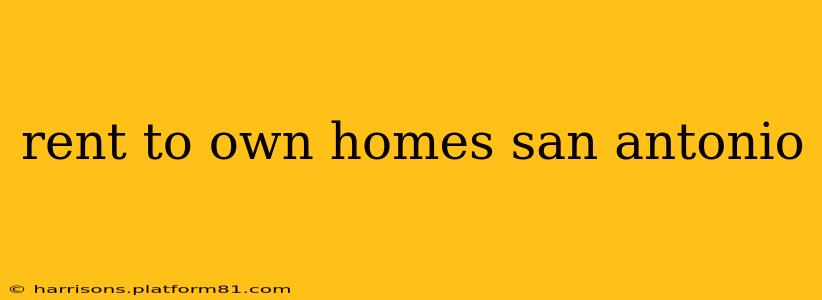San Antonio's vibrant real estate market offers a diverse range of options for homebuyers, and rent-to-own (RTO) agreements are becoming increasingly popular. This comprehensive guide explores everything you need to know about finding and securing a rent-to-own home in the Alamo City. We'll cover the pros and cons, the process, and answer frequently asked questions to help you navigate this unique path to homeownership.
What is a Rent-to-Own Home?
A rent-to-own agreement, also known as a lease-option agreement, allows you to rent a property with the option to purchase it at a predetermined price within a specified timeframe. A portion of your monthly rent payment goes towards the eventual purchase price, essentially building equity while you live in the home. This differs from a traditional lease, where you have no option to buy the property.
Pros and Cons of Rent-to-Own Homes in San Antonio
Pros:
- Builds Equity: A significant advantage is building equity while you rent, making saving for a down payment easier.
- Time to Prepare: RTO gives you time to improve your credit score and financial stability before purchasing.
- Avoids High Down Payments: Often, RTO requires a smaller down payment than a traditional home purchase.
- Market Familiarity: Living in the home allows you to familiarize yourself with the neighborhood and any potential issues before committing to buying.
Cons:
- Higher Monthly Payments: Rent-to-own payments are generally higher than typical rental rates.
- Risk of Losing Investment: If you can't purchase the home at the end of the lease, you lose the money applied towards the purchase price.
- Less Negotiating Power: You may have less negotiating power on the final purchase price than with a traditional purchase.
- Potential for Hidden Costs: Carefully review the contract to avoid unexpected fees or clauses.
How to Find Rent-to-Own Homes in San Antonio
Finding rent-to-own homes in San Antonio requires a strategic approach. Here are some effective methods:
- Work with a Real Estate Agent: A specialized agent familiar with RTO agreements can guide you through the process and help you find suitable properties.
- Online Listings: Websites specializing in rent-to-own properties often list available homes. Be cautious and thoroughly research any listings you find online.
- Networking: Talk to friends, family, and colleagues who may know of available rent-to-own opportunities.
- Directly Contact Homeowners: Identify homeowners who might be interested in a rent-to-own arrangement.
What are the Typical Terms of a Rent-to-Own Agreement?
Rent-to-own agreements vary significantly, but typically include:
- Lease Term: The length of the lease, usually ranging from one to five years.
- Purchase Price: The predetermined price at which you can buy the home at the end of the lease.
- Option Fee: A non-refundable fee paid to secure the option to buy the home.
- Monthly Payment: The rent payment, which includes a portion applied towards the purchase price.
What are the Closing Costs for a Rent-to-Own Home?
While a portion of your rent payment contributes to the purchase price, you'll still likely encounter standard closing costs when you exercise your option to buy. These costs can include:
- Down Payment (if any): The amount you pay upfront to finalize the purchase.
- Loan Fees: Fees associated with securing a mortgage to finance the remaining purchase price.
- Closing Costs: Various fees charged by title companies, escrow agents, and other parties involved in the closing process.
Is it better to buy a house outright or rent-to-own?
The best choice depends entirely on your individual financial situation and circumstances. Buying outright provides immediate ownership and avoids potential risks associated with RTO, but requires significant upfront capital. Rent-to-own offers a path to homeownership with less upfront investment, but carries risks if unforeseen circumstances prevent you from purchasing the home.
What Credit Score Do I Need for Rent to Own?
Credit score requirements for rent-to-own agreements vary depending on the landlord or seller. While a higher credit score improves your chances, some landlords may be more flexible than others. It's essential to discuss credit requirements directly with the property owner or their representative.
What Happens if I Cannot Buy the Home at the End of the Lease?
If you are unable to purchase the home at the end of the lease term, you will likely forfeit the money applied towards the purchase price. It's crucial to understand the terms of the agreement and ensure you can reasonably afford the purchase price before entering into the contract.
By understanding the process, advantages, and potential drawbacks, you can make an informed decision about whether a rent-to-own home in San Antonio is the right path for you. Remember to thoroughly review any contract with legal counsel before signing.
